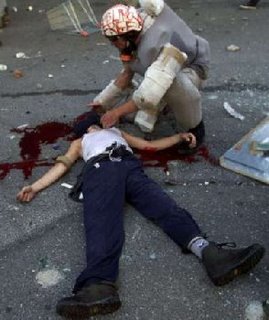In the news today is the discovery of a tape recording of the 1970 Kent State Massacre. It reveals that the National Guard troopers who shot four students dead were ordered to open fire. This is important because it shows a degree of deliberation in the massacre. The story kept to at the time was of spontaneous shooting triggered by panicking soldiers. The event had a huge effect, triggering a national student strike in the US involving university and high school students. The slogan of the protests was: They can’t kill us all.
I’m not reporting this naively believing that revealing the violence of the state, the iron fist in the velvet glove, is enough to save us but it does make me wonder about the mechanism that triggers this sort of phase shift into new levels of violence and how they relate to wider shifts in regimes of power. This relates to a debate we’ve been having in the Turbulence collective on the idea that this century has seen a strategic deployment of generalised war as a means of overcoming the failings of neo-liberalism.
Of course the Kent State shootings make you think of the turn of the century shootings of demonstrators, first in Gothenburg and then in Genoa. I remember thinking about Kent State on first hearing about the Gothenburg shootings. I was reading a newspaper report flying back from a Football tournament in Germany. I turned to a friend (little Matt) and said “Christ they’ve moved to bullets so quickly.” I wasn’t so much shocked at the level of violence but how early in the cycle of struggles the police had escalate to that level and were soon to tip over to a murderous one.
Apart from the speed of the escalation the other shocking thing over the next few months was that this new hyper-violent attitude towards protests appeared to be imposed right across Europe and North America at the same time. It was like a globalised race to the bottom in power relations, with Third World policing exported to the west. This wasn’t just the use of guns but the early and undiscriminating use of violence against protests seen most comprehensively at Genoa. Over the next few years it begged the question of the relation that this militarization had with the Neo-conservatives’ open strategy of imposing war – not as a continuation of politics by other means but as a means of managing society.
That last phrase is a bastardisation of Foucault in “Society must be Defended” and perhaps the problem might make a little more sense if we conceptualise it with the dispositifs of power he examines. The exemplary violence against the protests and then the imposition of war both show a movement towards sovereign forms of power. Of course Guantanamo bay fits with this and taken together might explain the popularity over the last few years of the concepts of sovereignty, and exception as the foundational outside of sovereignty, that Agamben has reintroduced.
I’m interested in the idea that there is a link between exception and excess. Negri criticises Agamben by saying his lack of social movement experience leads him to start with the structures of power over, constituted power. This makes him unable to make the leap downwards to connect it with the animating constituent power. I agree but think that Negri (who started life as a constitutional theorist) also starts with Empire and not with Multitude.
I’d argue that the state of exception could be produced out of a moment of excess. That the fear and uncertainty caused by moments of excess can provoke recourse to sovereignty from above and political sadness from below. The latter is a term that Collectivo Situationes use to describe the drawing back and closing of off potential experienced after the high point of struggle in Argentina. It refers to the temptation to allow the re-establishment of sovereign power because of an inability to cope productively with uncertainty. Then again, of course, neo-liberalism contains it’s own precarity and so carries its own potential to resort to sovereignty. Perhaps the narrative runs like this:
The first ‘heroic phase’ of the movement of movements is an attempt to escape the dispositifs of neo-liberal governmentality. The moment of excess within the movement runs into a sovereign response which is then reinforced by the excessive counter-sovereign violence on 9/11, which provides the neo-conservatives with the big opening they take advantage of to escape neo-liberalism’s gathering problems. This raises the idea that exception is produced by the challenge of either a constitutive moment of excess or sovereign violent excess. Perhaps it doesn’t matter which one of these it is from the sovereign’s point of view.
Of course all concrete assemblages are mixed. There are many different strategies being followed at any one time. They may just exist with a small circle of cranks until their time arrives, just look at the history of neo-liberal ideas. It’s important to resist a conspiracy view of power, where great men sit in a room and decide the time is now right for 10% more sovereignty in the mix. From the angle outlined above the mechanisms of power still seem obscured and slightly mystified, we can’t make the leap up, but the important thing is to retain the point of view of the movements. The problematic from this perspective becomes: how can we defend our moments of excess from sovereign violence without ourselves finding recourse in the sadness of sovereignty?



1 Comment